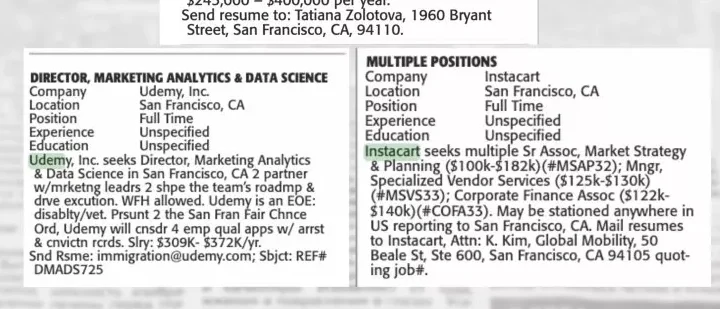American companies, including some in Virginia, are facing scrutiny for allegedly gaming a federal visa program by posting sham job ads meant to block U.S. workers and secure green cards for foreign employees already on staff.
At the center of the controversy is the Department of Labor’s Permanent Labor Certification (PERM) program — meant to ensure Americans get first crack at jobs, but increasingly described by critics as a loophole-ridden system that lets corporations “prove” no qualified U.S. applicants exist while keeping their preferred foreign-born employees.
The question of abuse, or at least disingenuous usage of the program, comes from the required job postings in print media and whether they’re a mere formality or if the American company is actually considering and screening American applicants. An investigation by ProPublica showed a number of listings in two major metro areas—Washington, DC and Columbus, Ohio—led to virtual offices and dead ends when attempting to contact companies’ human resources and recruiting offices. On multiple occasions, employees of the company admitted they were “PERM ads.”

According to the latest disclosure file posted by DOL, there were nearly 2,500 jobs in Virginia posted in the PERM program. Job titles ranged from software developers and civil engineers to landscaping employees and food preparation workers. Among companies with multiple listing is IT staffing company Antra, Inc based in Sterling looking for computer systems analysts, statisticians, and software developer. Some of these positions, for which they already have a foreign-born employee in mind, pay as much as $126,000 per year.
Banking giant Capital One has nearly 100 positions listed in Virginia alone. Most of the positions are in data analysis or software engineering. (RELATED: Virginia Revenue Surges, Bucks National Slowdown)
Questions over the value of the PERM program come as Americans graduating from college with degrees in fields such as computer science are struggling to find work while American tech and financial firms look to find a permanent spot for their temporary foreign worker.
The implication of PERM job advertisements is that companies already have a candidate in mind: the foreign-born employee whose visa is set to expire soon. Some argue the goal is specifically not to hire Americans, to bury these job ads in newspaper classified ads, which has seen circulation numbers plummet with the rise of the internet and social media, and “prove” to the Department of Labor that no Americans are qualified.
However, in 2007, an attorney that specialized in immigration law admitted publicly that the goal is to adhere the regulations as cheaply as possible and to do so without finding any qualified Americans.
A new website, Jobs.Now is attempting to expose the thousands of job listings required under PERM to a wider audience and to give more Americans a fighting chance at either filling these jobs or slowing down the process with a flood of American applications, forcing the company to cancel the listing and pause the process for the foreign-born worker. Instances of this happening have been found on social media.
Jobs.Now told Newsweek it believes “companies should follow the law” that requires them to ensure foreign-born workers “are not displacing equally qualified U.S. workers.” (RELATED: Spanberger Pockets $50K From Chinese Communist Party Member)
In recent years, some tech companies were sued by the Department of Justice (DOJ) for failing to adhere to PERM’s required process. In one instance, Meta, then called Facebook, was sued in 2020 over having “used recruiting methods designed to deter U.S. workers from applying to certain positions.”
The matter was resolved the following year when DOJ, Labor, and Facebook entered into a settlement in which Facebook is required to pay nearly $5 million in fines, $9.5 million to victims of their alleged discrimination of U.S. job candidates and providing training for their employees on anti-discrimination requirements of the Immigration and Nationality Act.
In 2023, Apple was subject to a similar agreement in which they were required to pay $25 million in penalties and compensation after the DOJ “found that Apple engaged in a pattern or practice of citizenship status discrimination in recruitment for positions it hired through PERM.”
Criticism of PERM is not new. Even advocates of the program have been calling for reforms. Lobbyists for the U.S. Chamber of Commerce and American Immigration Lawyers Association told ProPublica “Even if you are trying to sponsor someone who is already on the job, you have to act as if you aren’t. Increasingly, this jury-rigged system isn’t working for anyone.”
Going back as far as 1996, DOL’s Inspector General was sending warning signs that the program had serious flaws. They considered the requirement for job postings, also called the “labor market test” “perfunctory at best and a sham at worst.” This study determined that the goal of finding qualified American workers was failing after a total of five out of 28,682 applicants for nearly 11,000 jobs were hired.
In a 2020 report, DOL’s Inspector General provided a list of “vulnerabilities” found in PERM. Among those found, the report says the program’s regulations are outdated, particularly the requirement to advertise in Sunday editions of newspapers “as the primary recruiting announcement”, and that Labor “has not post-adjudication review and enforcement.”
Ultimately, unless Congress or the Department of Labor modernizes oversight and closes loopholes in PERM’s outdated requirements, critics warn the program will continue to function less as a safeguard for American workers and more as a bureaucratic pathway for employers to secure their preferred foreign hires.
(RELATED: DLCC Commits Seven-Figures to Virginia Legislative Campaign)

